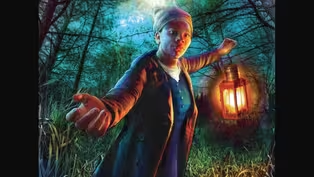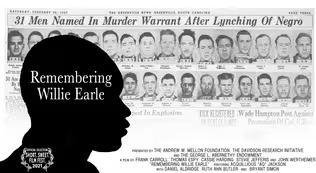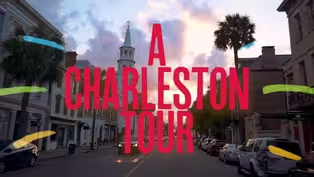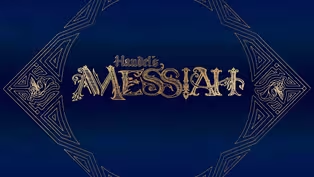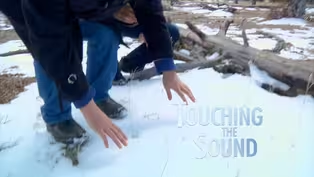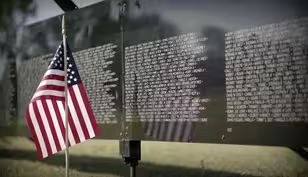
Breakfast in Beaufort: Journeys Through Time
Special | 26m 45sVideo has Closed Captions
A group of wise men, ranging in age from 84 to 101, gather weekly for coffee and breakfast.
A group of wise men, ranging in age from 84 to 101, gather weekly for coffee and breakfast.
Problems playing video? | Closed Captioning Feedback
Problems playing video? | Closed Captioning Feedback
SCETV Specials is a local public television program presented by SCETV
Support for this program is provided by The ETV Endowment of South Carolina.

Breakfast in Beaufort: Journeys Through Time
Special | 26m 45sVideo has Closed Captions
A group of wise men, ranging in age from 84 to 101, gather weekly for coffee and breakfast.
Problems playing video? | Closed Captioning Feedback
How to Watch SCETV Specials
SCETV Specials is available to stream on pbs.org and the free PBS App, available on iPhone, Apple TV, Android TV, Android smartphones, Amazon Fire TV, Amazon Fire Tablet, Roku, Samsung Smart TV, and Vizio.
More from This Collection
Find independent producers who have submitted programs to South Carolina ETV.
Harriet Tubman | From the Railroad to A Spy
Video has Closed Captions
Journey through the events and details of her incredible life story that are seldom told. (56m 46s)
Video has Closed Captions
On February 17, 1947, 24-year-old Willie Earle was brutally killed in South Carolina. (17m 13s)
Selections from Handel’s Messiah
Video has Closed Captions
Handel's Messiah performed by the Bob Jones University symphony and choirs. (58m 4s)
Video has Closed Captions
TOUCHING THE SOUND traces the artistic development of young pianist Nobuyuki Tsujii. (56m 46s)
Providing Support for PBS.org
Learn Moreabout PBS online sponsorship- You never know what you're gonna learn, so listen up.
Pay attention to your daddy, pay attention to people you respect.
Learn from them, however little it may be.
And one of these days, you'll put it to magnificent use.
(soft acoustic music) ♪ (soft acoustic music continues) ♪ ♪ (soft acoustic music continues) ♪ - Our breakfast group that we meet every Wednesday morning at 7:30 Blackstone's Restaurant, is a continuation of a tradition of a small town like Beaufort, where the men used to get together, had common interest, and had time to sit down and drink a cup of coffee together.
We go from the Second World War to the present day.
And we have men in our group that fought in all those wars.
And so, conversation around the table can vary, believe me.
(Robert chuckles) It covers every subject from war to sailing.
- The majority of the people that are sitting around that table, almost all of us, have in some manner in our backgrounds, been involved in a leadership role someplace.
And one of the common characteristics of good leadership is building a team of people that work together.
And I think that's the bond that keeps that group sitting around that table.
We are all looking to build a team to do something together.
- So when you're in this group, you're talking about values, culture, and the personal experiences you would only say basically to a family member.
So, every week is exciting.
- The honesty and their friendliness, even if they're disagreeing, the conversations is fascinating to me.
And I'm flattered that they invited me to join them.
But I, for the most part sit there and listen.
It's a history lesson.
(Merle chuckles) And then I have to remember what they said.
- You should always choose your friends.
You should always choose the group you're with.
And that's a good choice there.
And it's interesting to me, when I go to the breakfast in the morning, I don't know what I'm gonna come home with that day, but it's usually quite worthwhile, and it's surprising at times.
It's a good group.
- At breakfast, with this group of people, listen.
You learn so much.
The history.
We share a culture of respect, of learning... You can share who you are, and help them grow.
But much more importantly, you grow yourself by listening to them.
(gentle music) (projector clicks) - I love my dad.
He was a good guy.
He was a great fisherman, camper, living outdoors.
From the time I was old enough to crawl over the gunnel of the boat, he would take me with him.
And that's where I learned these rivers and waters, and how to survive, and how to get from point A to point B, how to watch the wind, how to watch the tide, how to watch the moon, to know what the tide's gonna do.
You learn it by walking on it, by seeing it, by negotiating it, by watching the tide come up.
You will know when what bank covers, and when one doesn't.
And you know what tide you can go, and whether it's coming in, going out, the wind... You can see.
You're gonna see it from the dry bottom to the high tide.
But you have to remember, you're gonna be coming back too.
And it might be dark, and it might be a different tide.
So every now and then while you're going from here to there, turn around and look back there, so that when you're headed home, you know what it looks like going that way.
And you won't get lost.
You will have way points and points of direction that you saw on the way going that way.
When I was a rifle company commander, we were going in the position at night, and the column got separated.
Dumb, stupid.
Should never happen.
But it did.
And so the column went ahead, the front half went on, and the back half was still sitting, waiting to move.
So I'm sitting there with bad guys all around, night in the middle of a high grass field, and my unit is split.
Worst thing I can think of.
'Cause I don't wanna shoot at them, and I don't want him to shoot at me.
You know, my own guys.
So I'm sitting there thinking, "What do I do?
What do I do?
What do I do?
How do I get outta there?
What do I do?"
And my dad taught me.
Just like looking in the back of you, to know where you're going when you're coming home, while you're going around, observe your surroundings.
See the fallen tree, see the stump, see the ditch, see that whatever registers, understand what it is, why it's there, where it is relative to what you are doing.
And one of the things he said was, "Look at the skyline, whatever it may be."
Well, if you're down the river, it's gonna be trees.
Look at the shape of the tree line.
You might need it one day.
So that night, in the middle of that field in Vietnam, all of these thoughts are going through my head, and not even registering that's what it was.
I was just looking and I said, "Oh, look at that tree line.
The shape.
I saw that this afternoon when we were doing the daylight walkthrough.
Yeah, I remember that.
Yeah, I remember that.
Where was I?
I know right where we are."
I led 'em out, because I recognized the tree line from before, that my dad taught me 40 years before.
- I remember an incident in 1996.
I was stationed with Fleet Marine Force Pacific Headquarters.
We had the first ever joint landing between the United States Marines and Russian Marines.
First time ever.
And it went off like clockwork, no problems.
But that was big news in the Marine Corps.
The commander of the entire Pacific Fleet wanted to have a dinner for the Russians.
So, the deputy commander said, "Pat I want you and Carol to have a table, and you're in charge of the table."
And he said, "There'll be a Russian admiral there, and an American admiral."
And he said, "You've got it."
And I said, "All right, sir.
I got it."
So the dinner went well, and dessert and coffee and drinks, and both admirals were drinking.
And I didn't like that, but...
I was in charge of the table, but I wasn't in charge of the admirals.
Come to find out that they knew each other.
Before they were admirals, they were submarine commanders.
Nuclear subs.
And they started arguing over, "I knew you were behind me.
I knew you were there.
No, you didn't.
I followed you all over the North Atlantic, the Baltic Sea.
I knew you were there constantly, and I followed you!"
And oh, and it kept getting uglier and uglier.
And they were loud and obnoxious.
And they're screaming at each other, it was horrible.
And they're raising up in their seats, and the Russian's face was red as a beet.
I thought he was gonna have a heart attack.
And my precious little wife... (tense music) Who was sitting right beside me, and right beside the Russian admiral, she reached over and put her hand on the Russian admiral's arm, and looked at him and said, "Admiral, do you have any grandchildren?"
And he went.... (Pat muttering) And he looked down to her, "Yeah!"
And I was hoping this American admiral would get the message to quiet down.
And she said, "Do you have any pictures?"
And he said, "Yah!"
And she said, "Can I see them?"
"Yah!"
It was always, "Yah!'
So he broke out his wallet, and he had pictures of his grandchildren.
And she got the picture out of our granddaughter, and they're comparing pictures, and she's talking to the Russian admiral, through the interpreter, naturally, and he had calmed way down, and just... That red beet color went away.
And the American admiral was quiet, thank goodness.
But that little girl, I'm convinced, saved a very embarrassing situation for me and the Marine Corps, by interceding on my behalf and taking charge.
- You were asking what was life like in particularly the racial divide, and the racial issues that were prevalent.
I am a child of the '50s.
Came of age in the '50s.
And it was a huge, huge part of my life.
We had hired a Black woman, wonderful, love her to death, named Beatrice Williams, who, was effectively, the nanny to my brother.
And the family became a part of who we were.
Beatrice's husband had lost his job, and mother knew that at the cotton mill, there was a job opening there in the mill for a cloth offer.
The only issue was that the cotton mill was 100 percent segregated.
There were no Black employees.
And mother said, "This isn't right.
John Williams can do that job, and there's no reason why he can't or shouldn't have that job."
And I will remember till the day I die...
The phone calls.
Not one, but more than one, around midnight to one o'clock in the morning, coming in, with the Ku Klux Klan threatening my mother's life.
And I can...
Excuse me.
(soft dramatic music) I can hear her today, say, "Well, there's no question you can probably kill me, but what you can't do is to keep me from doing what I know to be the right thing to do."
That's the lesson that I learned.
I think back, we talk about heroes... (soft dramatic music continues) My mom is my hero.
- One other thing that still aroused me today is the fact that, I think it was January or February of 1942, went to school in the third grade, and I said, "Well, where's Nobo Ayosaka and the rest of the Japanese kids?"
And they said, "They're in San Fran race camp, and they're gonna be sent to a camp someplace."
And we were just horrified.
And we said, "Well, weren't we at war with Japan and Germany too?
And why were they just picking on the Japanese?"
But that was one thing.
And later on, during teenage years in San Jose, they all came back.
And... Good reunions.
- You asked me about my involvement in obtaining the 1973 Vietnam Peace Trail.
Let me tell you this story.
The press announced that they were about ready to start peace talks in Paris.
There would be a peace talks that would involve North Vietnam, South Vietnam, the United States, and also France.
This would be held in Paris.
But they couldn't begin for six months because they had differences on the size of the table.
I was working at the time for a communications company, and I said to the executive vice president, "Our industry should really get involved in this."
Here's an illustration of a communication problem that can be solved, but people of different backgrounds and different directions.
Let's do it for our industry.
Let's contact 'em."
So he said to me, "Great idea, Daryl, but get realistic.
To do that, you've gotta really get the agreement between North Vietnam, South Vietnam, the United States... How you gonna do that practically?"
I said, "I agree with you.
It's gotta be difficult.
But if you don't mind, I'll make some after hour long distance phone calls, I'd like to try."
He says, "Go ahead and try, but I think you got mission impossible."
So I started out with the country chief that's in the State Department.
After a couple weeks, he called me back and said, "It's not possible.
They're not talking to each other, and the biggest hangups gonna be France, 'cause they're providing the table.
So I said, "What could be next?"
And I said, "There's gotta be somebody in the White House."
So I got a junior aide in the White House on the phone.
After a couple weeks, he called me back and said, "Daryl, it was a no go.
I couldn't get anybody in the French Embassy."
So I said to the junior aide in the White House, "Is there a way you can get me the home telephone number of the French foreign minister?"
He said, "Daryl..." He finally called me back and said, "You didn't get it from me, here's his number."
He was willing to take that risk.
God bless him.
So one day I got up thinking that I would probably get him while he's dressing, and he might take the call.
And I thought if I could get him at seven o'clock.
Well I miscalculated, I got him at six.
He started speaking French.
I said, "Sir, I don't speak French."
But he said, "Well, what's on your mind?"
And I told him briefly.
"We've had these problems.
Your embassy has said we can't do it, because what about the North Vietnamese?
And they also said, what about insurance?
What about these?"
And I said, "I'm speaking for the industry."
Of course, I didn't have the industry's permission, but that was my intent.
I said, "Would you be willing to give us a shot at this thing, but first offer to the North Vietnamese.
Give them the first shot.
Objective being, the communication within their country with value of communications.
And ask the South Vietnamese.
And if they say no, our industry will pay for it.
Well, your concern is the insurance?
We'll pay for the insurance.
Don't worry about the communication cost of moving over here."
I tried to answer their objectives, right down the line.
(Daryl sighs) Two days later, he sent me a telegram saying, "You got it!"
I couldn't believe it.
It's on my wall now.
And I, of course, gave it to the Smithsonian.
I called 'em up and said, "The country that has it."
(gentle acoustic music) - When I was young and growing up, and before 1939, my world was within three or four blocks on what we call the Old Point.
Times have changed.
I've seen a multitude of changes, both social and physical, and I think psychological in Beaufort over my lifetime.
- I think that our life, my life, was a lot simpler than the lives we happen to live now.
I think that the family deteriorated tremendously over that period of time.
And in my day, the family was the most important next to family and God and hard work.
That was the message to my generation.
That's not a message at this moment.
- People are not as friendly as they were when I was young.
I see a lot of hostility.
And the hostility that exists between some, based on their beliefs...
I don't like that.
I see a lot of anger.
- I see so much of, "Well, who's going to be taking care of me?"
As opposed to me taking care of me.
That change... That change of responsibility, is a shift that I don't like at all.
I really don't.
At the same time, I look back at the degree of prejudice that existed whenever I was coming along, and it was horrendous.
Absolutely horrendous.
It still exists, but the opportunities are much, much greater.
- You know, when I was growing up, rock and roll was the devil's talk.
You know, it was going to cause the world to collapse.
It didn't.
You know?
And so now, we see woke and everything, and we condemn that, and that's gonna cause the world to collapse.
Hopefully it won't, you know?
I mean, I don't know.
And I'm being very, very serious about that.
I just don't know.
I have high hopes that we will struggle on and continue on, that it will continue to get better, 'cause I think it's gotten better overall, But I'm not sure that it will.
I just don't know.
- I do worry about the children, the attitude, the way they look at things today.
The infernal cell phone, a bigger problem as they are, but we rely so much on instant gratification, on instant knowledge, on instant everything, and good stuff's not necessarily instantaneous.
It may take time to do it.
We've gained so many opportunities.
There's so much in the world today.
Every time you turn around, the very industry I was in did not exist when I was a child.
Cell phones and transistors and the technology that we have today, it creates opportunities all the time.
And instead of trying to develop those and make a better place for mankind, we just sit around and stew and fight with each other, and make war with each other.
It's crazy.
It's crazy.
- The TV and the cell phone and the computers have corrupted all of us.
And of course, you can't go back in time and change any of that.
We're stuck with it, if you might say.
It's changed an awful lot, to say the least.
And I don't think for the better.
I just wish that there's some way that we all could sit down and talk and resolve our differences, and come out with something that would benefit all of us.
What the world's turned into, I do not like.
- Every one of us, if you don't have a set of values by which you live your life and conduct your activities, you're gonna be pretty lost.
You're gonna be floundering around.
You're gonna be trying to figure out who you are and why you're here.
And you're supposed to find that out, why you're here, in my opinion.
And the sooner you can figure that out and find it out, the better off you're gonna be.
- So, I think, one of the things, for a dumb old farm boy, that has served me well, is the diversity of people that I have met.
And found out that in some cases, my preconceived notion was accurate.
And most cases, not quite as accurate as I thought it was gonna be.
Because sometimes people you think you don't like become very good friends, and they have qualities that you haven't even thought about yet.
And, and they come in handy.
You know, it's a two-way street.
You have a lot of experiences that they don't have, and you can help them, and they can help you.
You won't find anyone, in my mind, who hasn't had super, super setbacks.
But to learn how to deal with it, analyze it thoroughly, and then move on, because you've learned from that more than anything else... Failure is an extraordinary skill to learn, in a positive way.
You can't move forward unless you've had setbacks and you've learned from those.
How can you do it?
Whatever it is you're doing, I don't care if it's cutting the grass, or buying a house, or leading a corporation...
Accomplish the mission and take care of your men.
You do those two things, everything else is gonna fall in line.
The most gratifying thing a leader can hear is from a subordinate that said, "Yeah, I learned that from you."
Leadership is letting them do it, letting them learn, and... Let 'em take the credit too.
So at 92, I'll tell you the same thing.
Pay attention, enjoy what you got, be kind to others, be kind to yourself.
If you get tired, sit down and rest.
If you want to go, go.
And if tomorrow ends the string, no regrets.
Be happy, be kind, be productive.
Don't complain.
That's what this 92-year-old says.
(gentle music) ♪ (gentle music continues) ♪ ♪ (gentle music continues)
Support for PBS provided by:
SCETV Specials is a local public television program presented by SCETV
Support for this program is provided by The ETV Endowment of South Carolina.
